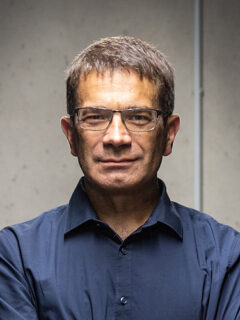Gerhard Wellein visiting professor High Performance Computing
Prof. Dr. Gerhard Wellein has started as visiting professor in High Performance Computing at our faculty. Gerhard is a Professor for High Performance Computing (HPC) at the Department for Computer Science of the Friedrich-Alexander-Universität Erlangen-Nürnberg (FAU) in Germany. He will travel regularly to Delft, to share his knowledge on High Performance Computing with the HPC team at our faculty.
Performance and energy modelling
Gerhard’s research is focused on the performance of computers. He elaborates: “We want to understand what is going on when computers solve our problems. And what happens when computers run and execute our codes. What are limiting factors in the computer?”
Based on that knowledge, Gerhard and the HPC team, can identify bottlenecks and devise code modifications, for example. “If my code runs faster, it will require less resources and it will also consume less energy”, says Gerhard. Computer efficiency is a big challenge within modern computer architecture. “It is important to find ways to make computers more efficient.”
Expensive energy consumption
Research into the energy consumption of computers, also reduces costs. “In Germany the energy costs are around €0,30 per kWh”, Gerhard explains. That means running a machine with one megawatt for a year means you will get a power bill of €2,5 million. And if you're on a 10 megawatt machine, it's €25 million per year. These systems are not only expensive to buy, but also very expensive to run. “That’s why it is important to have a structured understanding of what is going on inside that machine”, he emphasizes.
Human being learning, not machine learning
Gerhard uses an analytical approach to study high performance computing. He shares that this is quite a unique approach. “In this field, people tend to use machine learning to study computing performance. They generate a lot of data and try to analyze this automatically to draw conclusions. But we actually sit down and look at the code. We create a model for each hardware architecture and then we analyze the code. At the end of the day it is often pen and paper work. It is human being learning, not machine learning.” Gerhard has a vision for the future of HPC: “I think the long term vision is that that there's no longer HPC and AI, but there will be convergence between the two fields in many ways.”
Collaboration with TU Delft
In the past ten years there were already several projects in which Gerhard collaborated with TU Delft on High Performance Computing. Gerhard was already acquainted with Dr. Jonas Thies, who now works in our HPC group. “Jonas works on the algorithm side”, Gerhard explains, “he makes sure that the algorithm is chosen properly. And we make sure that the actual implementation of the algorithm on the computer is done properly. So our work really compliments each other.”
TU Delft is also trying to centralize the HPC infrastructure. Gerhard explains: “It's much more energy efficient to run a large cluster of (super)computers in one place, instead of running 10 smaller clusters distributed across different research groups. Three years ago the group at our university in Germany became a national supercomputing centre. TU Delft is on the road towards having a central team. And because of our experience, we can help to make sure that there is a strong central group up and running. I think TU Delft can really benefit from this. I can contribute to this through teaching and lectures, but also through research and meetings with TU Delft colleagues.”
Gerhard is very excited about the collaboration and about the city of Delft. “I love Delft! I’ve been there around three or four times now. I try to travel to Delft as much as possible. I really love the city, it’s a great place.”

